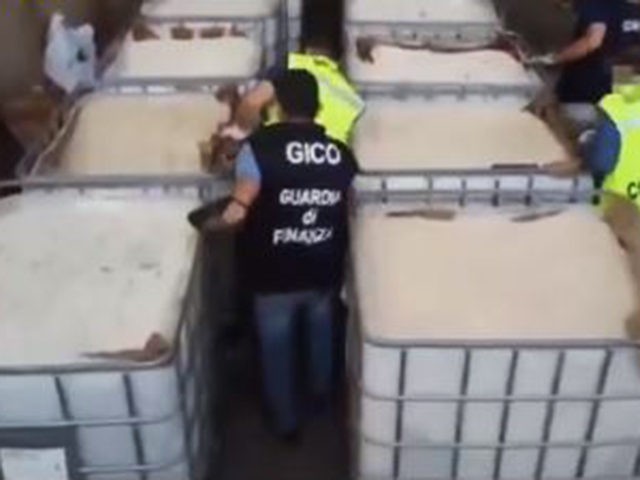The government of Italy announced on Wednesday it had seized 14 tons of an amphetamine labeled “captagon” en route to Europe from Syria. Italian officials reportedly believe Islamic State terrorists had produced the drug and introduced it to the market.
Captagon is a brand name for an amphetamine banned in the 1980s, originally created to treat narcolepsy, featuring fenethylline as a base. In modern times, the drug has become highly popular in the Middle East and the name “captagon” is used for a variety of street mixes that include amphetamine and caffeine or theophylline.
At the height of the Islamic State’s power in Syria and Iraq in the mid-2010s, when the group had established a “caliphate” including some of those countries’ biggest cities, captagon grew to develop a reputation for being a “jihad” drug, used to limit the inhibition of jihadis and allow them to stay awake for extended periods of time to commit human rights atrocities.
Italian Customs officials seized the drugs in the port city of Salerno, finding 14 tons representing about 84 million pills, according to the Associated Press (AP). The agency estimated the haul to be worth about $1 billion. It is believed to be the biggest seizure of amphetamines in history.
Italy’s Financial Guard posted a video of what 84 million pills looks like: giant transport containers that officials needed electric saws to cut through.
“Record seizure of 14 tons of amphetamines: 84 million pills coming from Syria [belonging to] ISIS/Daesh to finance terrorism,” the Financial Guard wrote on Twitter. “About 1 million euros of market value.”
Italian officials believe that what is left of the Islamic State — which still controls isolated pockets of terrain in Syria and Iraq but lost its “caliph,” Abu Bakr al-Baghdadi, to a U.S. military mission last year — is not only consuming captagon but manufacturing it to sell it to international criminal syndicates. The AP report noted that Italian officials believe that the receiving party expecting the captagon haul was one of several organized crime syndicates in Naples, less than an hour away from Saleron.
“Police say they’re investigating if Naples-based Camorra organized crime clans might have ordered the huge shipment for international sale, because two weeks earlier, a much smaller shipment of the drug was also seized in Salerno’s port in a shipment of clothing,” AP noted.
Jihadist outfits around the world use narcotics trafficking for financial gain. Among the most lucrative is the Taliban’s opium trade, as Afghanistan is home to most of the world’s poppy cultivation, allowing easy access. The Shiite terrorist group Hezbollah also has well-established ties to the socialist narco-regime in Venezuela and is believed to do business through the socialist regime’s oil minister, Tareck El Aissami. Drugs like the pain killer tramadol are known to circulate widely among Boko Haram jihadists in Nigeria.
Captured Islamic State jihadists have repeatedly mentioned the use of drugs on the battlefield to remove inhibitions about mass murder, rape, and torture.
“The brigade leader came and told us, ‘This pill gives you energy. Try it,’” an unidentified jihadist said in a 2015 BBC Arabic documentary. “So we took it the first time. You feel physically fit. And if there were ten people in front of you, you could catch them and kill them. You’re awake all the time. You don’t have any problems. You don’t even think about sleeping. You don’t think to leave the checkpoint. It gives you great courage and power.”
“They gave us drugs,” a teen jihadist named Kareem told CNN in 2014. “Hallucinogenic pills that would make you go to battle not caring if you live or die.”
In 2018, the U.S.-led coalition of nations fighting the Islamic State revealed it had seized $1.4 million worth of captagon in Syria, over a year after the liberation of Raqqa, the “capital” of ISIS.
“Despite Daesh’s [ISIS] façade of Islamic purity, its criminal terrorists are known drug users and traffickers. The cache included more than 300,000 pills of Captagon, an illegal drug frequently trafficked and used by Daesh members,” the U.S.-led coalition said in a statement at the time. “Captagon is a highly-addictive amphetamine-based drug that is banned in many countries. It is informally referred to as the ‘jihadists’ drug.’”
An investigation by The Century Foundation noted that the effects that jihadists claimed captagon causes within them do not match the known effects of the drug from when it was still legal, roughly for 20 years between the 1960s and 1980s. The report floats the possibility that the jihadists are experiencing a placebo effect from the notoriety the drug has gained in the Middle East, partly thanks to savvy statements from those manufacturing it. The loose definition of what amphetamine cocktail is labeled “captagon” also leaves open the possibility that whatever ISIS jihadists are taking on the battlefield does not fit the chemical profile of what was once marketed under the captagon brand name.

COMMENTS
Please let us know if you're having issues with commenting.